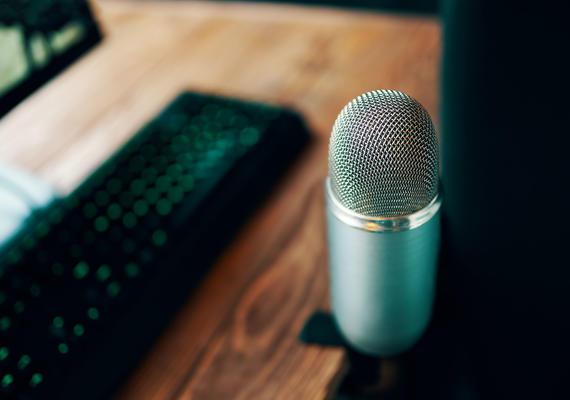
We can answer that.
The podcast where we sit down with UCalgary professors, researchers and experts to get the answers to five questions submitted by you.
Series overview
Have you ever wondered why face masks are such an emotional issue, or why it's important for a university to promote diversity and inclusion, or what "margin of error" in opinion polling actually means? Well, we can answer that.
Other ways to listen and subscribe
Apple Podcasts | Spotify | Google Podcasts
Series trailer:
In October, Stan, one of the most famous T. rex fossils in the world, sold at private auction for a jaw-dropping $31.8 million dollars. We don't know who the buyer was, which would suggest that it's going into a private collection, which also means it'll most likely be lost to scientific research.
We talk with Dr. Darla Zelenitsky, a paleontologist and dinosaur researcher, about how the fossil trade is a growing problem for researchers and museums around the world, and how it's only getting worse as sales like Stan's drive prices up.
"First, do no harm." Taking the Hippocratic Oath is a rite of passage for medical school graduates all over the world. The oath is a foundation of medical practice, forming the first code of ethics in Western medicine.
We talk with Dr. Abdullah Saleh, a paediatric surgeon and director of the University of Alberta's Office of Global Surgery, about how medical practitioners traveling to lower-income countries can end up doing more harm than good, even though they're trying to help.
We speak with Dr. Adam Murry, an assistant professor of Indigenous psychology, about his research project into quantifying the traits of allyship and how better understanding allyship can help both the groups who need it most and the people who want to be allies.
We speak with Dr. Peter Facchini, a professor of biochemistry in our Faculty of Science and chief scientific officer of MagicMed, about studying the medicinal properties of psilocybin mushrooms and other drugs, and how synthesizing and improving them could lead to better mental health treatments.
We talk to Dr. Stephen Larter, PhD, associate vice president of research and innovation at the University of Calgary, about how post-secondaries need to adapt to a changing world and how a university can help spark an economic recovery.
We talk to Dr. Beverly Adams, the senior associate dean of education at the Cumming School of Medicine, about how medical assistance in dying can offer choice and dignity to grievously sick patients and how medical schools are adapting to the practice.
We can't fight a deadly virus if we don't understand how it works. But studying infectious diseases is highly dangerous, and the number of labs that can do it is limited.
We talk to Dr. Paul Kubes, an infectious disease expert in the Cumming School of Medicine, about what goes into studying a deadly disease, how COVID-19 has changed scientific research, and UCalgary's newly reopened Biosafety Level Three lab.
Corey Hogan, former chief communications officer for the government of Alberta, tells us about some of the factors that can skew opinion polls, how to make sure they're as unbiased as possible, and how to look at them with a critical eye.
In this episode, we talk with Dr. Ari Agha, a choral singer and researcher with the City of Calgary, about potentially risking their singing voice when they embarked on testosterone therapy as part of their gender transition.
Dr. Peter Toohey, a professor of classics and author of the new book Hold On: The Life, Science, and Art of Waiting, talks about how we can better understand waiting, get better at doing it, and lead happier lives as a result.
Debbie Bruckner, senior director of student wellness at the University of Calgary, discusses some of the problems we're all facing in this most challenging year, warning signs to watch out for, and what we can do to take care of our mental wellness.
Dr. Yvonne Poitras Pratt, a Métis scholar who specializes in Indigenous education, gives us background on Orange Shirt Day and how this event can help spark broader conversations about Canada's history with Indigenous peoples and the brutal legacy of residential schools.
Dr. Malinda Smith, UCalgary’s vice-provost of equity, diversity and inclusion, answers questions about systemic racism, the role of higher education, and what each of us can do in our everyday lives to make the world more equitable.
Dr. Cara MacInnis, a social psychologist in our Department of Psychology, answers questions about peoples' attitudes towards wearing masks and why it's such a divisive issue.

Get in touch with us
Do you have an idea for a future episode or series?
Send us an email to podcasts@ucalgary.ca.
